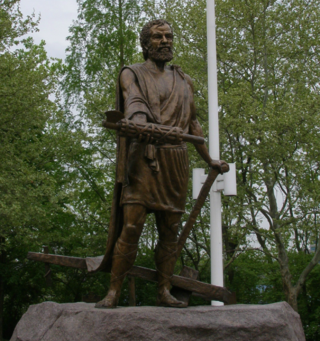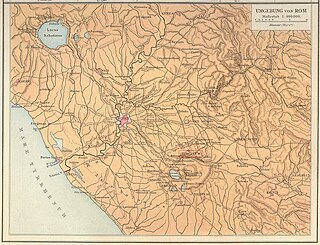Related Research Articles

Lucius Quinctius Cincinnatus was a Roman patrician, statesman, and military leader of the early Roman Republic who became a legendary figure of Roman virtue—particularly civic virtue—by the time of the late Republic.

The decemviri or decemvirs refer to official 10-man commissions established by the Roman Republic.

The gens Fabia was one of the most ancient patrician families at ancient Rome. The gens played a prominent part in history soon after the establishment of the Republic, and three brothers were invested with seven successive consulships, from 485 to 479 BC, thereby cementing the high repute of the family. Overall, the Fabii received 45 consulships during the Republic. The house derived its greatest lustre from the patriotic courage and tragic fate of the 306 Fabii in the Battle of the Cremera, 477 BC. But the Fabii were not distinguished as warriors alone; several members of the gens were also important in the history of Roman literature and the arts.
Titus Larcius was a Roman general and statesman during the early Republic, who served twice as consul and became the first Roman dictator.

The Battle of Mount Algidus was fought in 458 BC, between the Roman Republic and the Aequi, near Mount Algidus in Latium. The Roman dictator Lucius Quinctius Cincinnatus turned an expected Roman defeat into an important victory.

Lucius Minucius Esquilinus Augurinus was a Roman politician in the 5th century BC, consul in 458 BC, and decemvir in 450 BC.
Appius Claudius Crassus InregillensisSabinus was a Roman senator during the early Republic, most notable as the leading member of the ten-man board which drew up the Twelve Tables of Roman law around 451 BC. He is also probably identical with the Appius Claudius who was consul in 471 BC.

The gens Minucia was an ancient Roman family, which flourished from the earliest days of the Republic until imperial times. The gens was apparently of patrician origin, but was better known by its plebeian branches. The first of the Minucii to hold the consulship was Marcus Minucius Augurinus, elected consul in 497 BC.
Spurius Larcius was one of the leading men of the early Roman Republic, of which he was twice consul. However, his greatest fame was won as one of the defenders of the Sublician bridge against the army of Lars Porsena, the King of Clusium.
Lucius Sergius Esquilinus was a Roman politician, and member of the Second Decemvirate in 450 and 449 BC.
Titus Genucius Augurinus was a Roman politician in the 5th century BC, consul and decemvir in 451 BC.
Gaius Horatius Pulvillus was a Roman politician during the 5th century BC, and was consul in 477 and 457 BC.
Lucius Papirius Crassus was a consul of the Roman republic in 436 BC and possibly a censor in 430 BC.
Gaius Papirius Crassus was a Roman senator who held the executive state office of consul in 430 BC, as the colleague of Lucius Julius. During their year in office, an eight year long truce may have been signed with the Aequi, but this is uncertain. The consuls also enacted a law which allowed for the payment of fines in cash instead of livestock, in response to some heavy fines levied by the censors, Lucius Papirius and Publius Pinarius. Although the initiative for this law had come from the plebeian tribunes, the consuls preempted them by introducing the measure themselves.
Gaius Servilius Axilla was a Roman aristocrat and statesman during the early Republic. He held the senior executive offices of consul in 427 BC and consular tribune in 419, 418 and 417 BC. He also served as master of the horse, or deputy, to the dictator Quintus Servilius Priscus Fidenas in 418 BC, when the latter had been appointed to wage war against the Aequi.
Manius Sergius Fidenas was a consular tribune of the Roman Republic in 404 and 402 BC.
Marcus Horatius Turrinus Barbatus was a Roman senator from the early Republic, who served as consul in 449 BC alongside Lucius Valerius Poplicola Potitus. According to Roman historical tradition, he and Valerius played an important role in ending the Decemvirate and bringing harmony between the patrician and plebeian orders. To the two consuls are traditionally attributed the Valerio-Horatian Laws, which gave full force of law to measures passed by plebiscite, restored the right of any citizen to appeal to the people, and confirmed the sacrosanctity of plebeian tribunes. The historicity of these laws has been doubted.
Appius Claudius Crassus Inregillensis was a Roman politician and general. According to the historian Livy, he delivered a speech to the senate in 368 BC unsuccessfully opposing the proposal to open the executive office of consul to plebeians. In 362, after the plebeian consul of that year had been killed in battle, Claudius was nominated dictator and campaigned against the Hernici, obtaining some successes but with heavy losses of his own. He died shortly after taking office as consul in 349.
References
- Beloch, Karl Julius (1926). Römische Geschichte bis zum Beginn der Punischen Kriege. Berlin: Walter de Gruyter. p. 17. doi:10.1515/9783111473659. ISBN 9783111106748.
- Broughton, T. Robert S. (1951). The Magistrates of the Roman Republic Volume I: 509 B.C.–100 B.C. New York: American Philological Association. p. 41.
- Münzer, Friedrich (1932), "Minucius 41", Realencyclopädie der classischen Altertumswissenschaft (RE, PW), volume XV, part 2, column 1955.
- Ogilvie, R.M. (1965). A Commentary on Livy, Books 1–5. Oxford: Clarendon Press. pp. 438, 445.